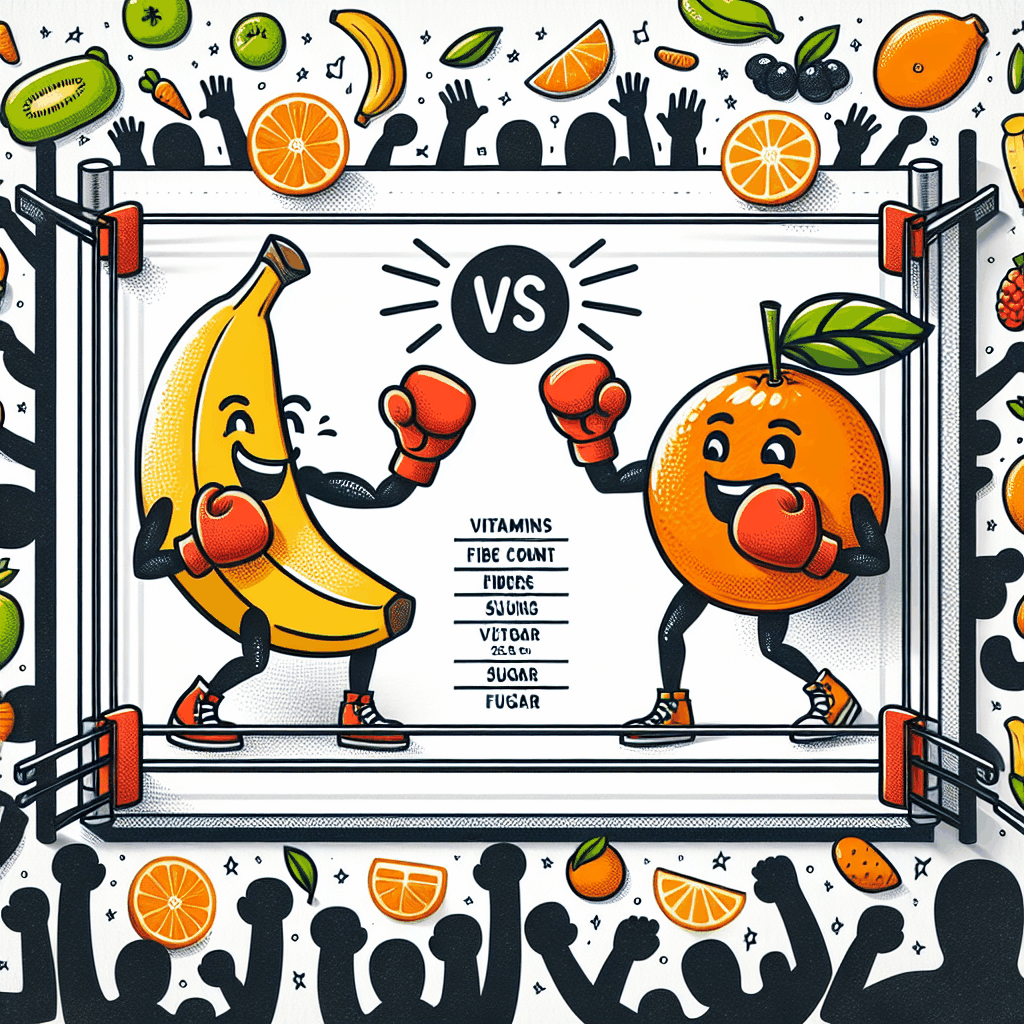Introduction: Bananas vs Oranges
In the fruit world, bananas and oranges are both superstar staples, each packed with their own unique nutritional offerings and noteworthy flavors. Loved worldwide for their convenience and versatility, these fruits stand as a go-to snack for many, but how do they fare in a nutritional face-off? Each has its own legion of dedicated consumers, but how do they line up when their health benefits are compared? Read on as we peel back the layers of this juicy debate and delve into the showdown between bananas and oranges.
Understanding Bananas
Bananas, native to Southeast Asia, are one of the most popular fruits globally, consumed for their sweet, creamy taste and high nutritional value. High in potassium, Vitamin C, and Vitamin B6, bananas serve as an excellent source of immediate energy. Due to their high fiber content, they are also beneficial for digestive health. Their high potassium content aids in cardiovascular health and maintaining blood pressure levels. Furthermore, bananas are also rich in antioxidants which provide protection against free radicals in the body.
The Virtues of Oranges
Oranges, predominantly grown in warmer climates, are famed for their tangy sweetness and abundant Vitamin C content. Known for boosting immunity, oranges also boast high fiber content, aiding in digestion. They are rich in antioxidants and phytochemicals, which help fend off chronic diseases. Additionally, the citrus fruit provides essential minerals like calcium and potassium, contributing to strong bones and a regulated blood pressure. The orange peel, often discarded, contains vast amounts of vitamin B6 and dietary fiber that merit its inclusion in diets.
Nutritional Values of Bananas and Oranges
While both fruits offer excellent nutritional value, they have some differences. Bananas, per 100 grams, contain 96 calories, 1.3 grams of protein, and 27 grams of carbohydrates, making them an ideal energy snack. Oranges are lower in calories, with 43 per 100 grams, and contain 1.2 grams of protein, and 11 grams of carbohydrates, offering a lighter alternative. In terms of Vitamin C, oranges emerge superior with 53.2 milligrams per 100 grams, compared to 8.7 in bananas. However, bananas take the lead in potassium content with 358 milligrams per 100 grams, outdoing oranges’ 181 milligrams. This makes both fruits exceptional in their own right, but personal nutritional requirements dictate the choice.
Health Benefits of Bananas
Bananas can provide significant benefits to the heart due to their high potassium content, which regulates blood pressure and prevents heart disease. They’re also a rich source of dietary fiber, helping promote gut health and regular bowel movements. With high levels of tryptophan that converts into serotonin, bananas help improve mood and overall mental health. Additionally, their antioxidant properties reduce inflammation and oxidative stress, potentially lowering the risk of chronic diseases.
Health Benefits of Oranges
Oranges, rich in Vitamin C, help in strengthening the immune system and fighting common illnesses. They are also abundant in dietary fiber promoting good digestive health and assisting in maintaining a healthy weight. The high amounts of antioxidants they contain contribute to protecting the body against chronic diseases and inflammation. Moreover, the significant calcium content in oranges promotes bone health, while their potassium aids in maintaining heart health and regulating blood pressure.
The Beautiful Origins: Bananas
Bananas trace their origins back to the region of Malaysia, spreading through the Philippines and India, where Alexander the Great first discovered these exotic fruits. Historical records suggest that cultivation of bananas might date back as far as 8000 BC or even earlier, making them perhaps the world’s oldest known fruit. Chinese scholars documented the first cultivation of bananas in 200 AD, while Arabic conquerors spread bananas from Asia to Africa in the 6th century. Later, with the advent of Islam, bananas reached Palestine and subsequently entered the Mediterranean region known for its conducive growing climate. Bananas finally made their way to the Americas, brought over by Portuguese explorers and missionaries in the 15th century.
The Beautiful Origins: Oranges
Oranges originated in Southeast Asia, likely in the regions of present-day India, Vietnam, or southern China. From there, they spread to the Mediterranean via the Silk Road in the 1500s, with Italian, Portuguese, and Spanish explorers introducing the citrus fruit to the Americas. Cultivated for thousands of years, oranges have become deeply intertwined with local cultures and traditions. The orange tree was considered sacred in ancient societies for its fruit’s healing properties. Today, top orange-producing countries include Brazil, the United States (predominantly Florida and California), and China, where the climate is sunny and conducive to growing oranges.
How to Incorporate Bananas and Oranges into Your Diet
Incorporating bananas and oranges into your diet is both easy and beneficial. Bananas make a great addition to smoothies, cereal, or yogurt for an energizing breakfast, while oranges can be juiced or sliced into salads for a vitamin C rich meal. Even desserts can be healthily tweaked with bananas serving as a sweetener in recipes or oranges offering a zesty flavor in cakes and tarts. Using orange peels in teas or grating them as zest onto dishes, can boost fiber intake. Habitually alternating between bananas and oranges as a daily snack can ensure you leverage the unique health benefits of both.
Summary: The Peculiar Battle of Bananas vs Oranges
In the peculiar battle between bananas and oranges, there is no outright winner as both fruits possess unique nutritional profiles and health benefits, making them wonderful additions to any diet. While bananas outpace oranges in potassium and energy-boosting carbohydrates, oranges exceed bananas in their wealth of Vitamin C. Ultimately, the choice between these two fruits depends largely on one’s individual nutritional needs and flavor preference.
SEO Powered ByBreakout Content AI
